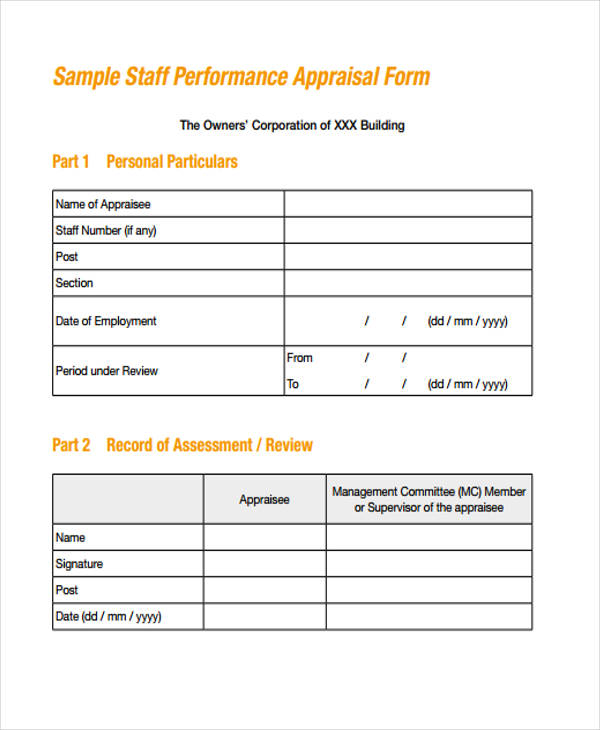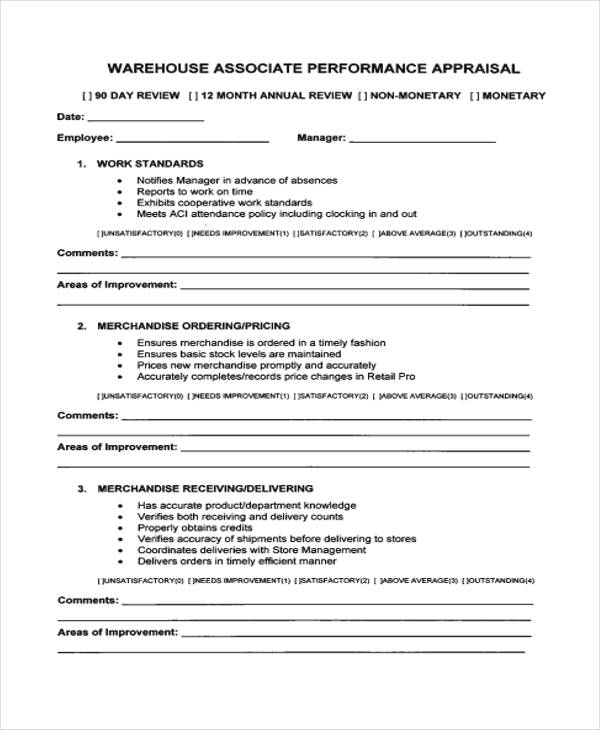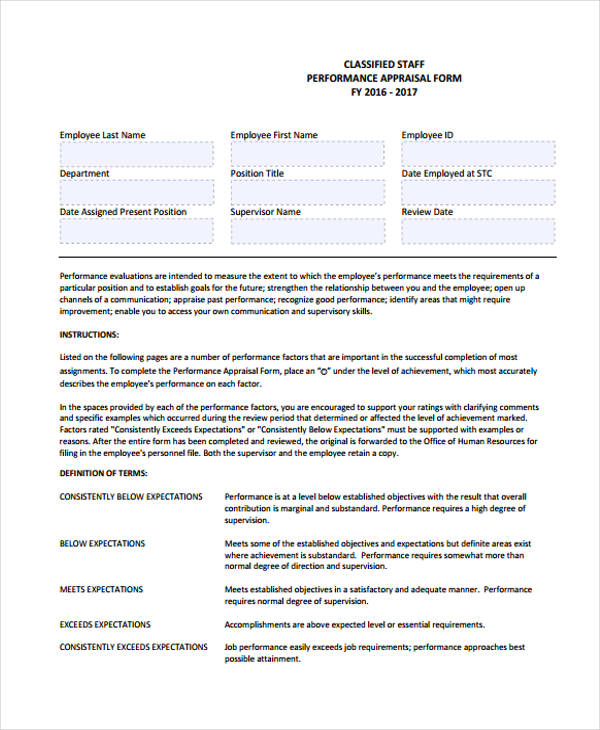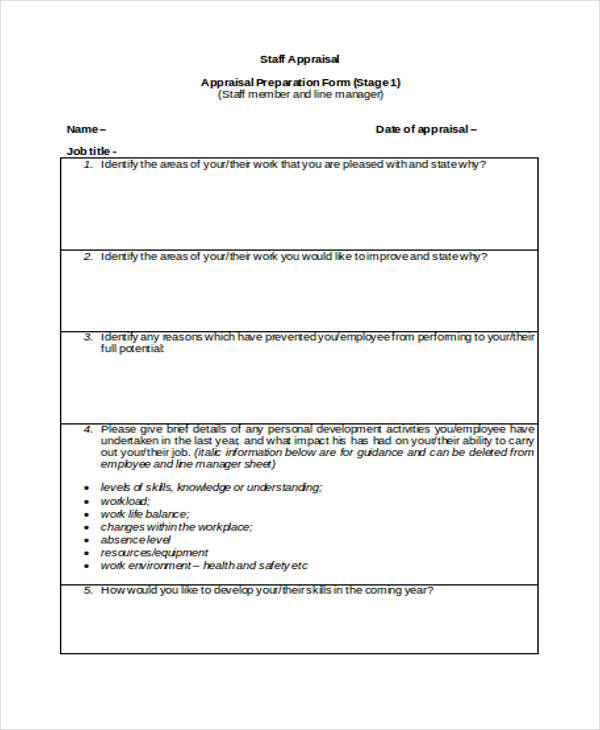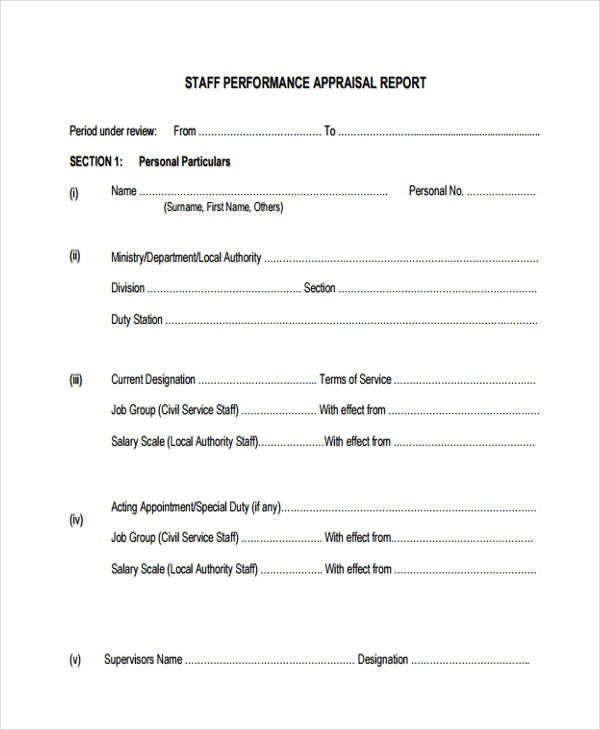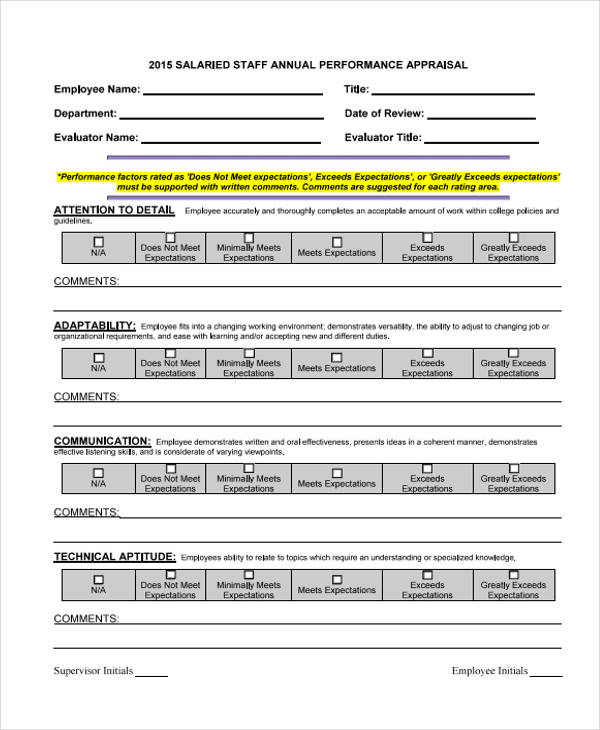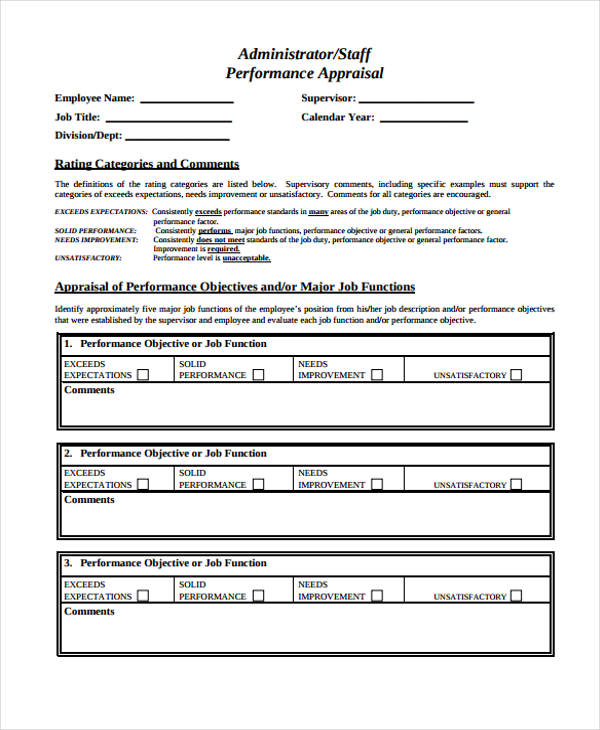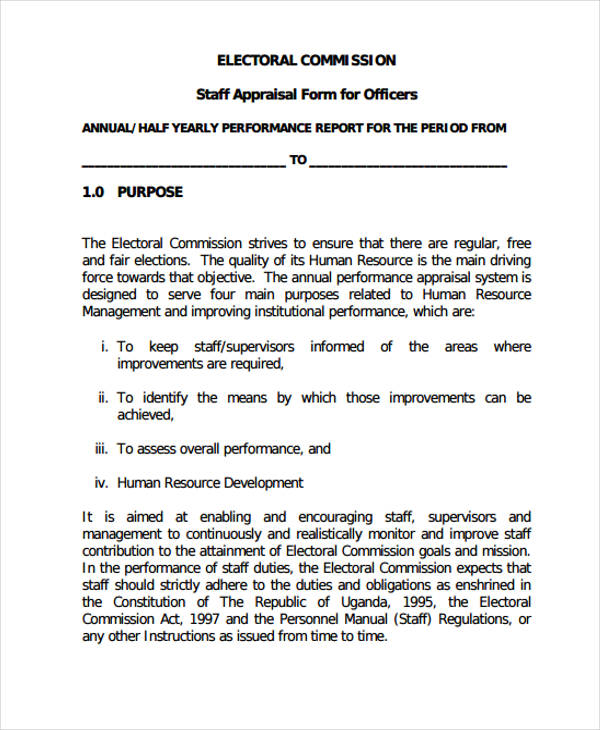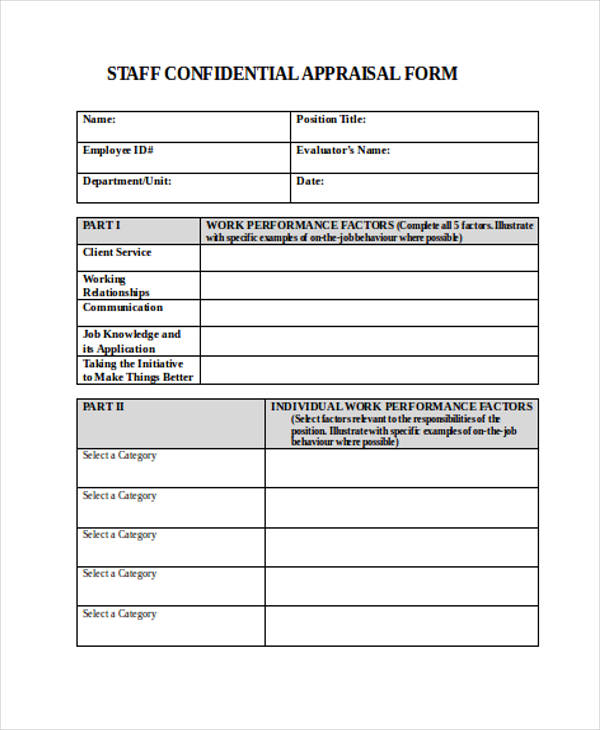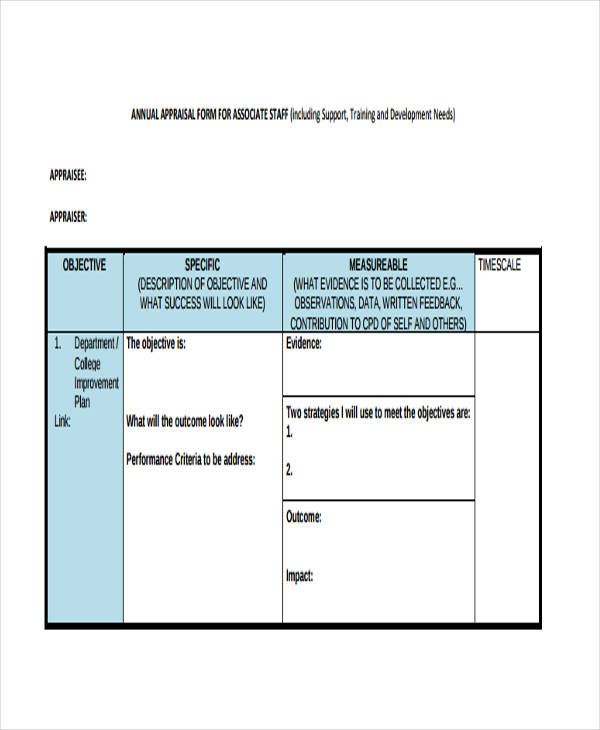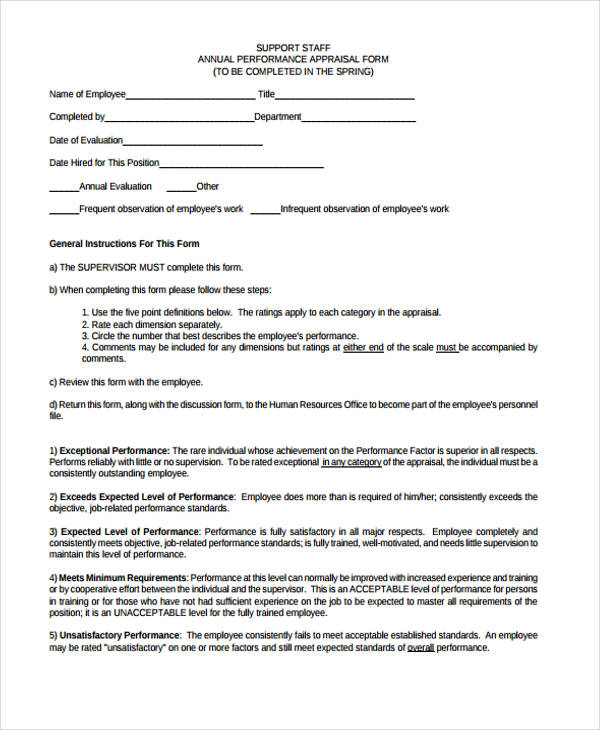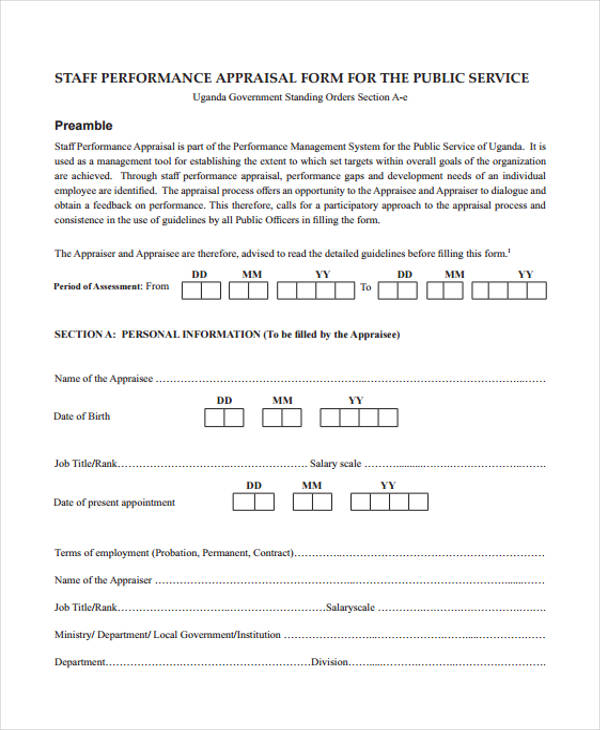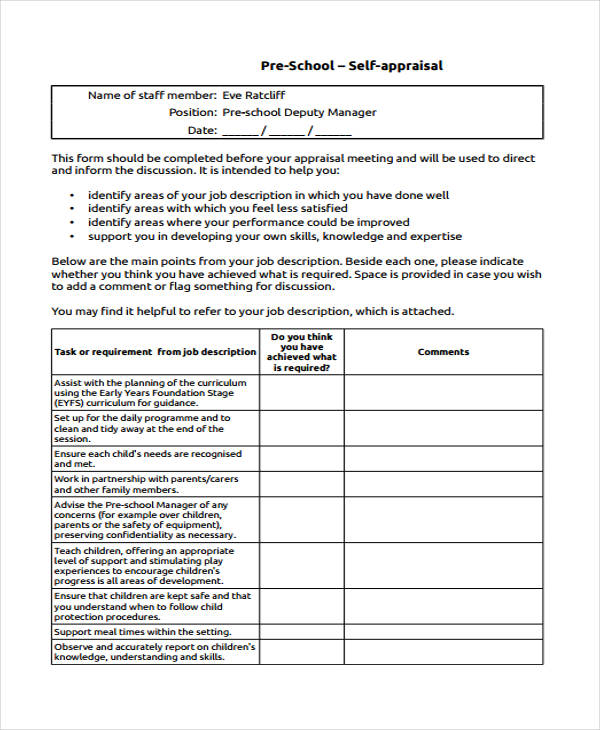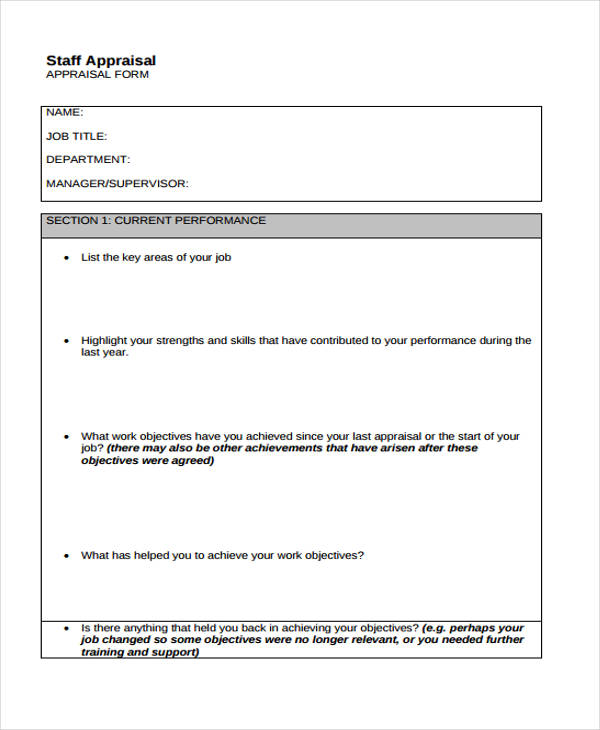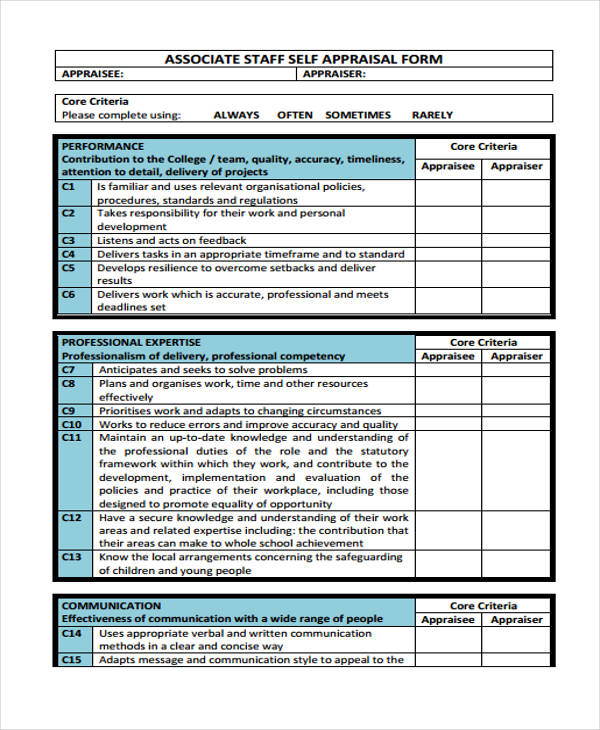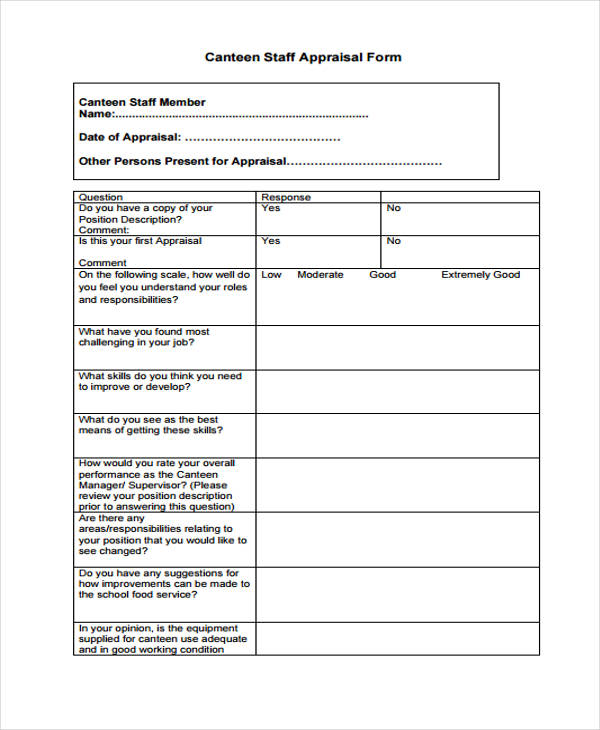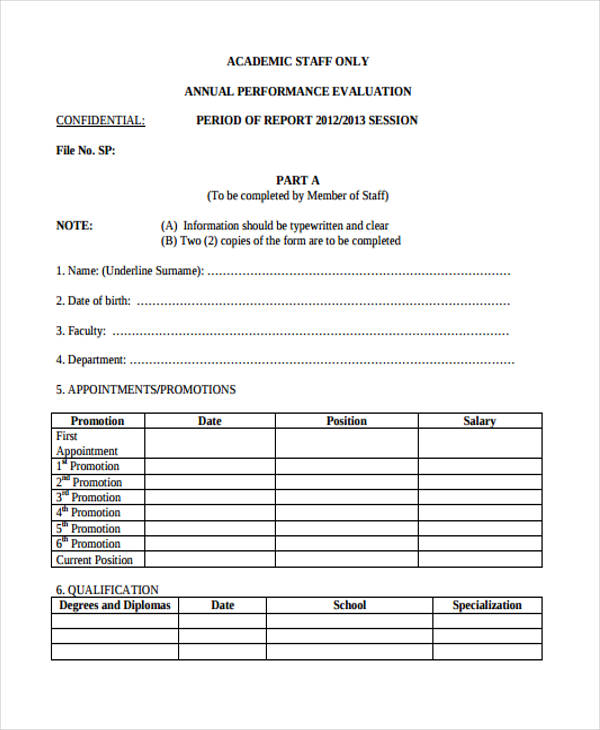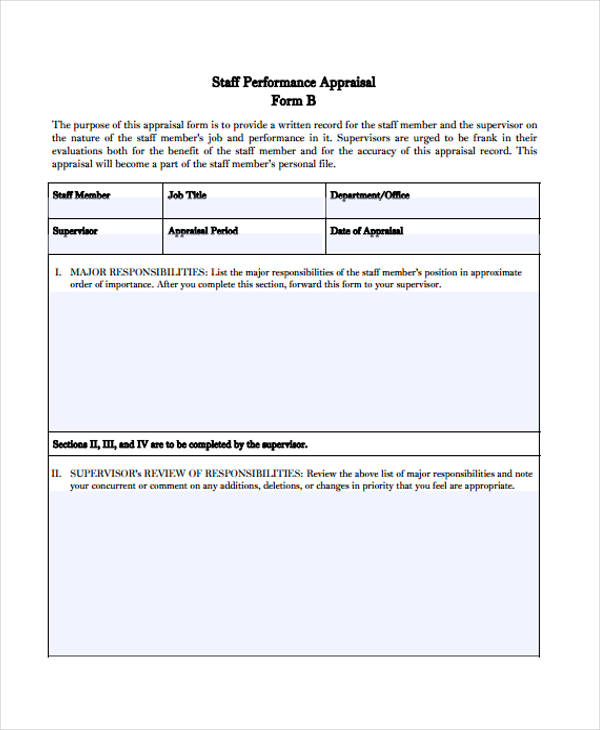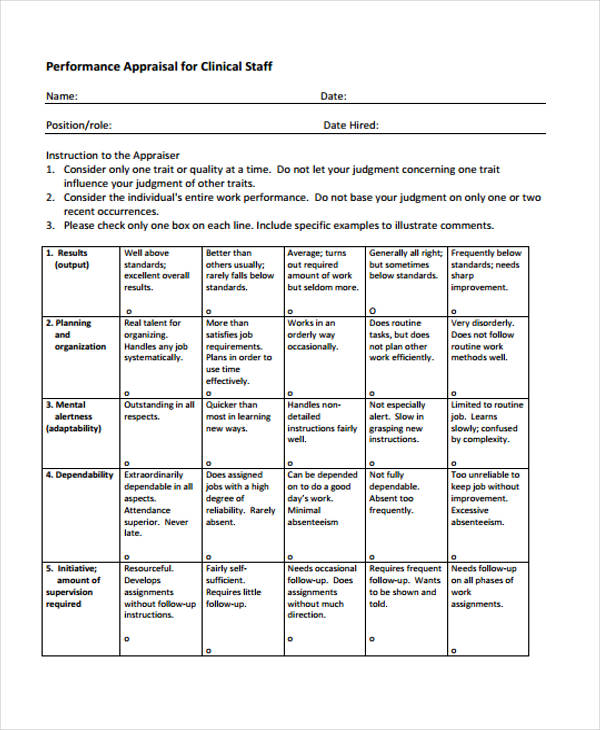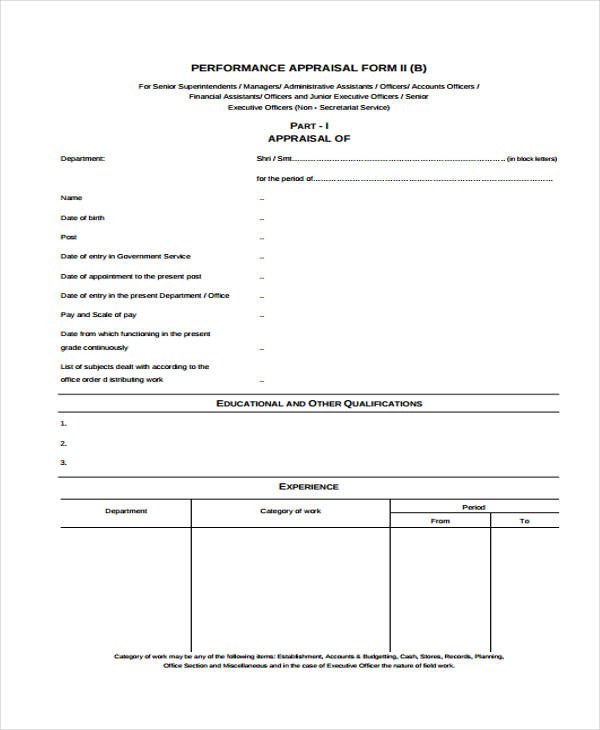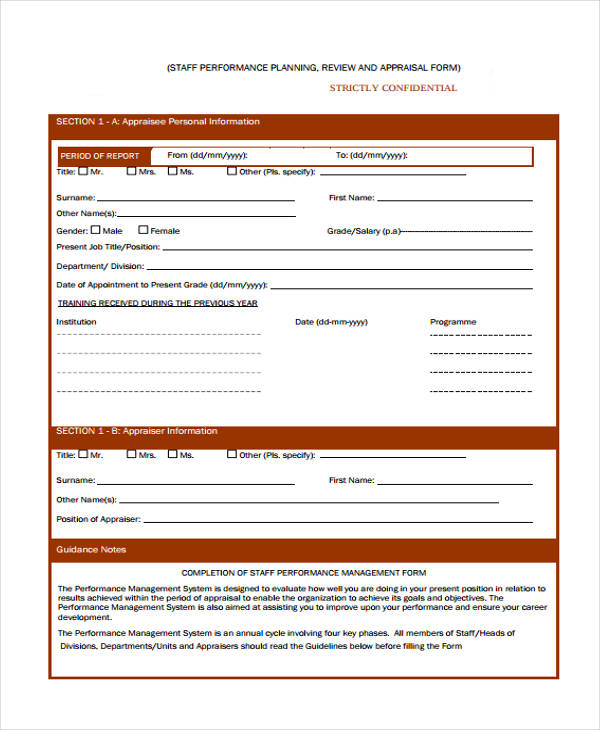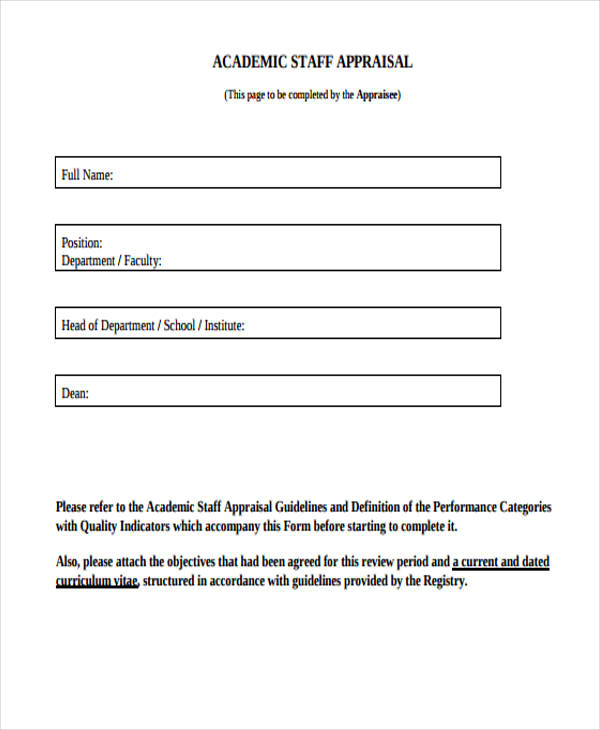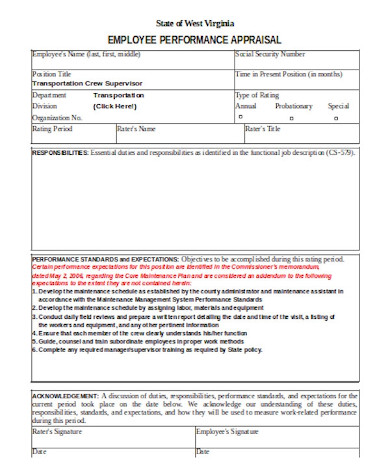An appraisal is the act of evaluating someone or something to ensure that it is up to par with the quality and the standards that have been established. In an office setting, appraisals are very much a useful and integral part of calibrating the performance of employees and rewarding them in turn.
Employers usually want to make sure that they are getting their money’s worth by maintaining and retaining staff that is competent, and conducting periodic evaluations and appraisals allows them to do just that. If you are planning to evaluate your employees to make sure that they are performing well at work, then you can download our sample evaluation forms and appraisal forms. Our forms are in .doc format and are easily accessible for your convenience.
Staff Performance Appraisal Forms
Staff Performance Appraisal Form Sample
Warehouse Associate Performance Appraisal
Classified Staff Performance Appraisal Form
Staff Appraisal Technique Form
Staff Appraisal Preparation Form in DOC
Staff Annual Appraisal Forms
Sample Staff Performance Appraisal Report Form
Salaried Staff Annual Performance Appraisal Form
Administrator Staff Appraisal Form
Administrator/Staff Performance Appraisal Form
Electoral Staff Appraisal Form
Electoral Commission Staff Appraisal Form
The process of conducting a performance appraisal involves the objective and unbiased review of an employee’s skills, abilities, achievements, potential, strong suits, areas where an employee can improve more, as well as to reward performing employees and to impose disciplinary measures on those who are not performing well.
Appraisals vs. Evaluations
Although they are commonly interchanged, a performance appraisal and a performance evaluation have numerous distinctions between them. However, both processes are methods used by employers to review the performance of an employee.
Performance evaluations and appraisals are done by companies or employers because they ultimately want to make sure that they are maintaining and retaining employees who are capable and competent. It allows employers to get their money’s worth and to determine if work objectives have been met. Performance Appraisals at the same time motivate employees to work and perform better.
An appraisal is typically a broader part of an organization’s performance management system while an evaluation is a mere step in the appraisal process. In an evaluation, supervisors or managers provide feedback and plans of action to an employee relating to the employee’s quality and quantity of work produced, punctuality, and job skill. A performance appraisal on the other hand evaluates the performance of an employee relating to business objectives as a whole.
During the process of a performance appraisal, an employee and a supervisor have to be clear about the goals and required outcomes of success that are based for assessment. These goals have to be clearly and properly established prior to conducting any type of evaluation or appraisal in order to properly set expectations among employees.
Appraisals measure the extent to which an individual may be rewarded in the form of an increase of compensation compared to other employees. Second of all, appraisals are used to identify the tools and training needs that are needed to be provided by an employer to aid his employees to attain the company’s goals. Finally, appraisals promote growth and development among employees and within the company because it allows individuals to improve and work on their weaknesses while nurturing their skills and their strong suits.
Employees usually react negatively to evaluations and appraisals, especially since it takes up a lot of time and effort. However, appraisals are more often than not able to attain key results that are needed by both employers and employees.
Because performance appraisals allow managers and supervisors to identify strengths and weaknesses, they can then develop plans and tasks to help an employee develop in their career and to attain their goals. This will then help employees improve their productivity and promote loyalty and commitment. Establishing a reward system for employees will also help boost employee morale and encourage productivity and diligence in the workplace.
Staff Confidential Appraisal Form
Staff Confidential Appraisal Form in DOC
Support Staff Appraisal Forms
Associate Staff Annual Appraisal Form
Support Staff Annual Performance Appraisal Form
Employee Staff Appraisal Form
Sample Employee Performance Appraisal Form
Nursery Staff Appraisal Form
Nursery/Pre School Staff Self-Appraisal Form Template
Care Staff Appraisal Form
Child Care Staff Appraisal Form
Support Staff Appraisal Forms
Associate Staff Self Appraisal Form
Administrative Staff Annual Performance Appraisal Form
Canteen Staff Appraisal Form
Canteen Staff Appraisal Form in PDF
The Advantages of Appraisals
Establishes a Reward System to Recognize Performing Employees
A lot of companies and employers choose to point out employees who excel at what they do versus those who do not at all. Through this method, supervisors can call the attention of non-performers for coaching, dismissal, or demotion while those who are performing well are rewarded with a promotion or a salary increase.
Measures the Amount of Salary Increase
A Performance Appraisal allows employers to put a value on an employee’s worth to the company. Employees who are performing well will be rewarded by meriting an increase in their compensation, their benefits, their allowances, or their incentives. Conducting appraisals and evaluations helps employers determine how much increase is to be given to one employee compared to another, depending on their performance.
Maximizes an Employee’s Potential
A Performance Appraisal is the result of a Performance Evaluation and allows supervisors to identify an employee’s talents and abilities. By doing so, supervisors and managers will be able to properly profile employees and assign them to teams or departments where they can work efficiently and where they will be able to fully maximize their work potential and their skills.
Helps to Motivate Employee Development
Performance Appraisals also allow supervisors to properly analyze an employee’s strong and weak abilities and conduct training policies or programs to help them improve on areas where they are struggling at.
Enhances Employee and Management Communication
A Performance Appraisal promotes communication among the management and among employees because it allows supervisors to understand and accept their subordinate’s set of skills and weaknesses. This also helps supervisors look at things through their subordinate’s point of view.
Performance Appraisals also allow employers and employees to maintain a friendly and cordial management relationship, boosts employee morale, and allows employees to give out suggestions on how the management can help them improve better.
Provides Motivation
The main purpose of having Performance Appraisals is to motivate employees to perform well. Through promotions and a periodic increase in compensation, an employee becomes more driven to perform better and go beyond his comfort zone to achieve more and increase productivity.
Academic Staff Appraisal Form
Example of Academic Staff Annual Performance Appraisal Form
Basic Staff Appraisal Form
Basic Staff Performance Appraisal Form in PDF
Dental Staff Appraisal Form
Sample Clinical Staff Performance Appraisal Form
Finance Staff Appraisal Form
Financial Assistance Staff Performance Appraisal Form Template
Free Staff Appraisal Form
Sample Staff Performance Review and Appraisal Form
Academic Staff Appraisal Form
Example of Academic Staff Appraisal Form
Formal Staff Self Appraisal Form
A Performance Appraisal aids in a company and an employee’s growth and development just as long as it is conducted via an efficient, objective, and unbiased method. Below are steps on how to properly conduct a Performance Appraisal so that it benefits both you and your employees:
1. Identify Goals and Objectives
Employers or supervisors should first meet with employees to review policies or updated information relating to the evaluation and appraisal process. Be sure to give out accurate and precise details that you want them to know, including future opportunities that employees can potentially merit or the goals and objectives that you want employees to target as a basis for your evaluation. Be consistent with your terms as soon as you disseminate them to your employees; try not to make any alterations in the middle of an evaluation process as this will only confuse them.
2. Encourage Employee Interaction and Communication
When meeting with your staff to discuss goals, use this as an opportunity as well to forge ties with them. Ask them to prepare for the meeting by listing down topics that they want to discuss, such as career goals. Give employees a chance to provide comments or explanation about the feedback that you have given to them during the evaluation and allow them to further discuss and compare your self-assessments to theirs.
3. Review Performance Evaluations
Evaluating employees is always a good time for reviewing processes and getting to know your employees better. Use the results of your evaluation as an entry point for discussion. Review the important parts of the evaluation and discuss any challenges that the employee is finding difficult to attain. Brainstorm on strategies to help employees resolve work and productivity issues and give them a pat on the back for their achievements.
4. Discuss Ideas for Improvement and Plan of Action
While you are outlining the employee’s good and bad performances, it is also best to provide control or preventive measures in order to hone your employees into becoming more efficient and productive. Find out what goals and plans the employee has for their career and if they align with the company’s vision as well, and then discuss the skills and experience that the employee needs to accomplish to attain his goals.
As soon as you and the employee have established a set of goals, be sure to let yourself and the employee list down the action plans that you have brainstormed to guide you and the employee. These plans of action need to be realistic and achievable to both parties.
5. Establish a Support System
As a supervisor, it is expected of you to provide support to your team members to help them become more inclined to performing better at work. Ask your employees if there is anything you can do to help them become more motivated at work and provide them with the necessary tools and training that they need in order for them to maximize their potential and to boost their passion for work.
Related Posts
-
FREE 9+ Sample Staff Performance Appraisal Forms in PDF | MS Word | Excel
-
Nurse Appraisal Form
-
Performance Appraisal Form
-
FREE 7+ Sample Supervisor Appraisal Forms in PDF | MS Word
-
FREE 10+ Property Appraisal Forms in PDF | MS Word
-
FREE 9+ Sample Jewelry Appraisal Forms in PDF | MS Word
-
Appraisal Form
-
Appraisal Waiver Form
-
FREE 6+ Sample Home Appraisal Forms in PDF
-
FREE 8+ Sample Faculty Appraisal Forms in PDF | MS Word
-
FREE 6+ Sample Auto Appraisal Forms in PDF
-
FREE 8+ Sample Appraisal Evaluation Forms in PDF | MS Word
-
FREE 8+ Sample Management Appraisal Forms in PDF | MS Word
-
FREE 6+ Sample Customer Appraisal Forms in PDF | MS Word
-
FREE 8+ Sample Appraisal Feedback Forms in PDF | MS Word

